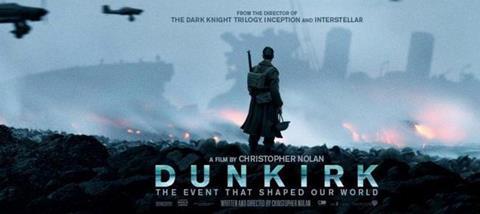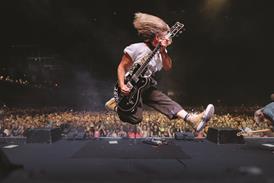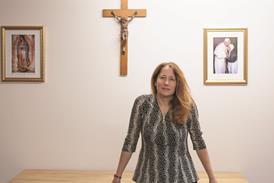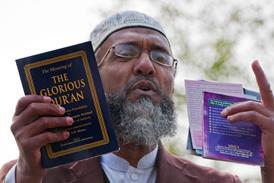
In his blog post ‘How a day of prayer saved Britain at Dunkirk’ (written before the release of Christopher Nolan’s film) J.John clearly describes the perspective on the evacuation that has become known as the 'Miracle of Dunkirk'.
Those who have read the post and now seen the film might be disappointed that this latest cinematic portrayal appears to tell a rather different story.
The film does not mention the National Day of Prayer, and only briefly refers to the halting of the German tanks, the storm that grounded the Luftwaffe and the calm sea that made the evacuation possible. Some might consider this to be another example of the elimination of God as an actor from history and politics. But that would be to miss the opportunity to reassess the perspective of the 'Miracle of Dunkirk', to reflect upon the nature of miracles and prayer, and to benefit from what Christopher Nolan’s film offers to this generation.
There is no doubt that in May 1940, as some 400,000 troops were trapped between the sea and the advancing German army, King George VI called for a National Day of Prayer, to which many in the nation responded. It is also widely accepted that three subsequent factors were important in the success of the evacuation, and which are referred to by some people as miraculous. The German army halted the advance of their tanks, a storm grounded the Luftwaffe and the subsequent calm sea enabled the flotilla of small boats to reach the beach.
But do any of these three factors truly constitute a miracle? And, at a time when the film is raising interest in the evacuation among a new generation, is reference to the so-called 'Miracle of Dunkirk' helpful or harmful to people finding faith in God?
When we consider how God acts in this world that he created and sustains, it might be useful to consider three different terms which can be used to describe three different types of God’s providence:
- General Providence. This is God’s ongoing provision for all people. This is so reliable and predictable that we can describe the results by what we call 'laws of nature'. Examples are that the sun provides warmth to the earth, that seeds germinate and that plants grow, providing us with vital food.
- Non-miraculous Providence. This is what appears to be God’s special provision at particular times, but which is still consistent with the laws of nature. We might refer to this colloquially as 'God’s perfect timing', such as the doctor that happened to come upon the scene of an accident, or the parking space that happened to be available just when we needed it.
- Miraculous Providence. This is God’s special provision at particular times when he acts outside of the laws of nature. We see this most clearly in the miracles of Jesus, as he gave sight to a man born blind, restored a withered hand, or raised someone from the dead – in each case God acted in a special way, different from his normal sustaining of the world, so it appears to break what we call the laws of nature.
As we place our faith in God, we will give him thanks for all of his providence. But we must be careful not to downgrade the miraculous, which not only belittles God but can also lead people to view faith in God as at best irrelevant and at worst ridiculous – particularly when we claim that something is miraculous when they obviously see it as consistent with the natural world.
How, then, should we view the three events of the so-called Miracle of Dunkirk? And how might these be viewed by people who do not share our faith in God?
Hitler’s halting of the tanks can have a perfectly natural explanation in that he wanted to preserve them from unnecessary damage, so that they could continue to be used in his war effort (indeed that explanation is given explicitly in the film).
The storm that grounded the Luftwaffe and the subsequent calm on the sea can have perfectly natural explanations in terms of weather systems. For those of us with faith in God, we may indeed see them as non-miraculous providence and give God thanks for his provision at that crucial time. But claiming them as inherently miraculous over-states the case and may, unfortunately, hinder people from treating the gospel seriously.
So, how did God answer on the National Day of Prayer? Perhaps we might reflect on the nature of prayer, and consider whether it is not so much 'us asking God to change his mind to be more like ours' but rather 'us asking God to change our minds to be more like his'. Certainly (alongside the providence of the halted tanks, the storm and the calm) what happened at Dunkirk is that many individuals, with extraordinary courage and at huge personal risk, joined together to offer whatever skills and resources they had in a selfless effort to rescue others. And that is the perspective that Christopher Nolan offers in his film Dunkirk.
Brilliantly bucking the trend of recent war films, Nolan does not resort to gore and special effects as he provides an immersive experience that enables the viewer to empathise with the young soldiers in their apparently hopeless situation, trapped between the sea and the advancing German army.
By cleverly moving around the timeline, we experience the different perspectives on land, sea and air. And as the individual stories braid together we get as close as cinema can take us to a profoundly personal experience of the event which Nolan describes as 'communal heroism in the face of adversity'.
Particularly powerful is the interplay between two characters on one of the 933 small boats heading to Dunkirk. Cillian Murphy plays a shell-shocked soldier picked up from a torpedoed ship, on the outward journey, and desperate not to be taken towards the beach. Previously having starring roles in Nolan films (Inception, The Dark Knight) here Murphy is credited only as 'Shivering Soldier', a nameless character who represents the 338,000 beaten and demoralised men who were rescued.
Also in the boat is the 17-year-old George (played by Barry Keoghan) who is the only character whose back-story is revealed, when he says he has never achieved anything but wants to do something valuable with his life. George’s only skills appear to be making tea and carrying life-jackets, thus providing a poignant representation of the many ordinary people who joined together to make the Dunkirk evacuation possible.
Nolan says: "as a group of people we can achieve so much more than we can individually." And that is an important message for all of us.
As we pray for our nation today, perhaps we can pray that God will open our eyes to see how we can use our limited skills and resources for the common good. And perhaps, as we do so, more people will come to realise that those skills and resources come from God who provides for all of us, and wants us all to come into a right relationship with him and with one another.
Nick Pollard is co-founder of EthosEducation.org and EthosMedia.org which provide free downloadable resources to help school pupils and the general public to explore spiritual, moral, social and cultural issues through the latest films




























